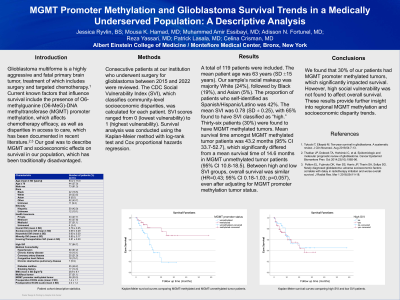MGMT Promoter Methylation and Glioblastoma Survival Trends in a Medically Underserved Population: A Descriptive Analysis
Friday, April 21, 2023

.jpg)
Jessica Ryvlin, BS
Medical Student
Albert Einstein College of Medicine
Bronx, New York, United States
ePoster Presenter(s)
Introduction: Glioblastoma multiforme is a highly aggressive and fatal primary brain tumor, treatment of which includes surgery and targeted chemotherapy. Current known factors that influence survival include the presence of O6-methylguanine (O6-MeG)-DNA methyltransferase (MGMT) promoter methylation, which affects chemotherapy efficacy, as well as disparities in access to care, which has been documented in recent literature. Our goal was to describe MGMT and socioeconomic effects on survival in our population, which has been traditionally disadvantaged.
Methods: Consecutive patients at our institution who underwent surgery for glioblastoma between 2015 and 2022 were reviewed. The CDC Social Vulnerability Index (SVI), which classifies community-level socioeconomic disparities, was calculated for each patient. SVI scores ranged from 0 (lowest vulnerability) to 1 (highest vulnerability). Survival analysis was conducted using the Kaplan-Meier method with log-rank test and Cox proportional hazards regression.
Results: A total of 122 patients were included. The mean patient age was 62.7 years (SD ±15.4 years). Our sample’s racial makeup was majority White (23.0%), followed by Black (18.9%), and Asian (4.9%). The proportion of patients who self-identified as Spanish/Hispanic/Latino was 41.8%. The mean SVI was 0.7905 (SD ±0.2498), with 65.6% found to have SVI classified as “high.” Of the 106 patients with completed pathology reports, 37 (30.3%) were found to have MGMT methylated tumors. Mean survival time amongst MGMT methylated patients was 43.2 months (95% CI 33.7-52.7), which significantly differed from a mean survival time of 14.6 months in MGMT unmethylated patients (95% CI 10.8-18.5). Between high and low SVI groups, overall survival was similar (HR=0.43; 95% CI 0.18-1.03; p=0.057), even after adjusting for MGMT methylation status.
Conclusion : We found that 30% of our patients had MGMT promoter methylated tumors, which significantly impacted survival. However, high social vulnerability was not found to affect overall survival. These results provide further insight into regional MGMT methylation and socioeconomic disparity trends.
Methods: Consecutive patients at our institution who underwent surgery for glioblastoma between 2015 and 2022 were reviewed. The CDC Social Vulnerability Index (SVI), which classifies community-level socioeconomic disparities, was calculated for each patient. SVI scores ranged from 0 (lowest vulnerability) to 1 (highest vulnerability). Survival analysis was conducted using the Kaplan-Meier method with log-rank test and Cox proportional hazards regression.
Results: A total of 122 patients were included. The mean patient age was 62.7 years (SD ±15.4 years). Our sample’s racial makeup was majority White (23.0%), followed by Black (18.9%), and Asian (4.9%). The proportion of patients who self-identified as Spanish/Hispanic/Latino was 41.8%. The mean SVI was 0.7905 (SD ±0.2498), with 65.6% found to have SVI classified as “high.” Of the 106 patients with completed pathology reports, 37 (30.3%) were found to have MGMT methylated tumors. Mean survival time amongst MGMT methylated patients was 43.2 months (95% CI 33.7-52.7), which significantly differed from a mean survival time of 14.6 months in MGMT unmethylated patients (95% CI 10.8-18.5). Between high and low SVI groups, overall survival was similar (HR=0.43; 95% CI 0.18-1.03; p=0.057), even after adjusting for MGMT methylation status.
Conclusion : We found that 30% of our patients had MGMT promoter methylated tumors, which significantly impacted survival. However, high social vulnerability was not found to affect overall survival. These results provide further insight into regional MGMT methylation and socioeconomic disparity trends.
